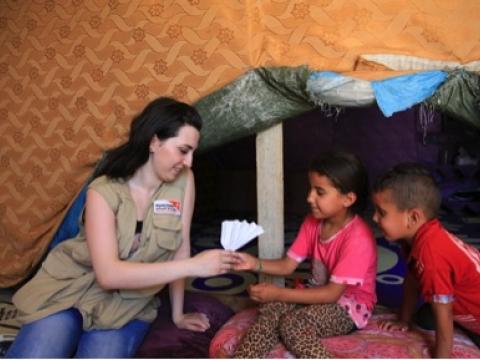A day in the life of a humanitarian in Lebanon

Words by Therese Boulos, photographs by Suzy Sainovski
I’ve worked as World Vision Lebanon’s Cash Project Coordinator for the World Food Programme Project since October last year. We do distributions of e-cards, monitoring of shops where beneficiaries buy goods and follow up on beneficiary’s concerns. This is a picture of me in the office in the Bekaa Valley. I started working with World Vision for a three month contract as a field distribution assistant, I had recently graduated and needed experience. When I got involved in the work and beneficiaries started telling me about their challenges including leaving behind all their belongings in Syria to live in difficult conditions without even some of the basic necessities of life, this made me feel responsible and accountable to them. I wanted to help in any way I could.
This family moved to Lebanon the month after the conflict started in Syria in 2011. I actually heard a bomb blast from Syria while I was in their tent. The border isn’t that far away. In spite of their difficult living conditions, they still have a sense of humour, especially the father who smiled a lot and expressed the family’s difficulties using humour. In addition to that they were very hospitable and offered us tea. The food cuts are affecting this family. They haven’t eaten meat in 7 months and they are increasingly going into debt to secure their food necessities. One of the hardest things about my job is that we are limited by donor funding and can’t help as much as we’d like to.
It was such a hot day that day. While sitting in the tent, I tried my best to not let the family realise I was feeling so hot. It felt like a sauna in there. It was such a nice surprise when Rasha (in pink) made me a fan. This act of kindness was very touching. She has to live in these harsh conditions every day. I'm still thinking about how they deal with this heat and their challenges with water. Usually, I don't drink that much water, but that night I drank so much when I got home and even woke up in the middle of the night feeling very thirsty.
The oldest brother Ali (who didn’t want to be photographed) found a way of expressing himself through drawing when they experienced harsh winter conditions last year. He has studied some Turkish and you can see Turkish words about the cold next to the drawing. Truly, last winter was one of the toughest winters. The temperatures dropped to ten below zero. We did a distribution in winter and we were freezing cold even though we were wearing proper winter clothing. It must have been so cold for the refugees living in those conditions with only thin clothes, living in a tent and sometimes without a stove or heater and not very warm blankets. It must have been very difficult.
Rasha (7) and Shahed (9, in black) have no electricity to watch their favorite cartoon show SpongeBob SquarePants. The family couldn’t afford to pay their last electricity bill so it was cut off. I was surprised that they like the same shows we used to watch and that they tell the same stories we heard from our parents like Little Red Riding Hood. They are kind, smart girls who are trying to adapt to hard conditions that children shouldn’t have to endure. They are missing out on school and have to handle bigger responsibilities than they should have to. The girls drew their favourite characters from the show while I was there.
This is Shahed showing her drawing of SpongeBob SquarePants.
Rasha and Shahed showed me the place where they like to play in the tented settlement.
One of the best things about my job is seeing the smile in a child’s eyes.